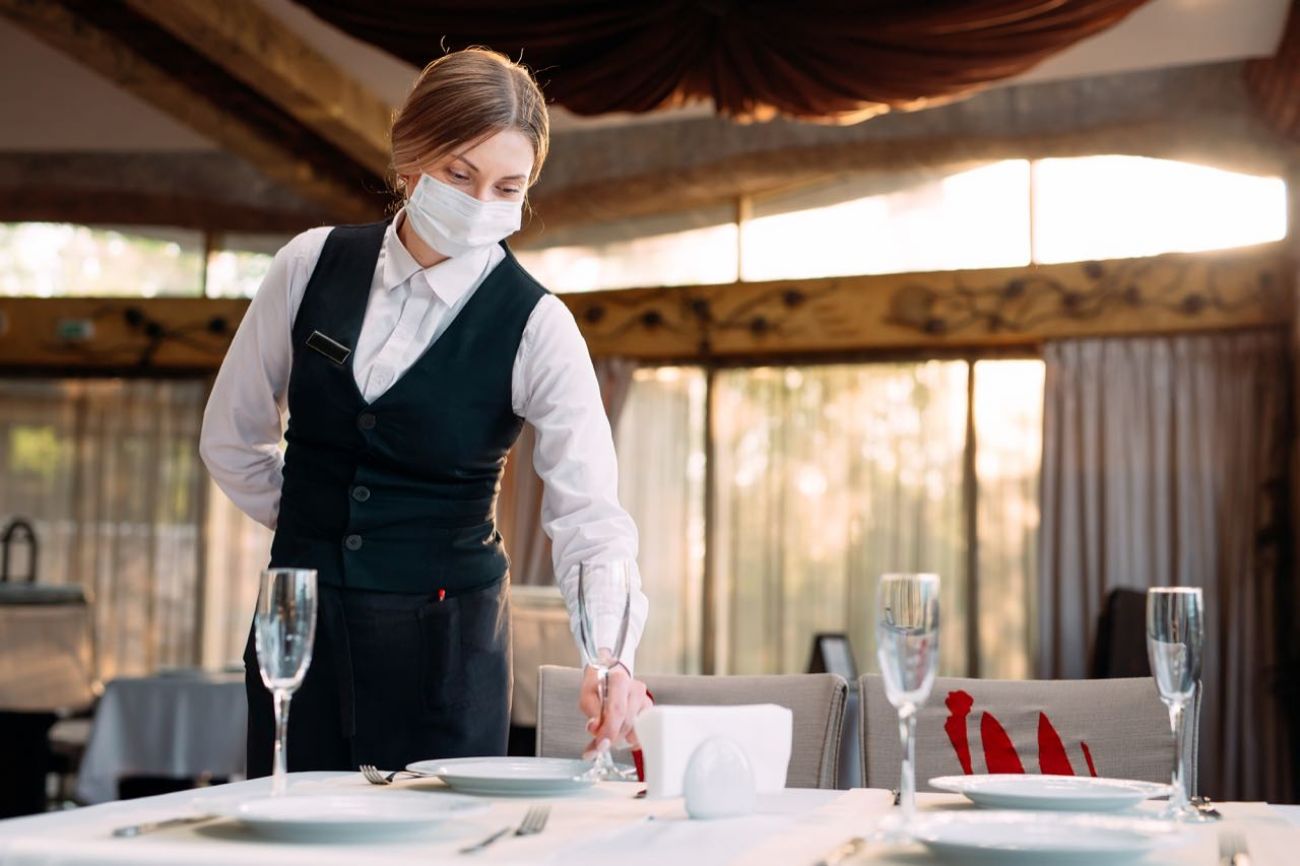Whitmer administration leaves restaurants in dark on new COVID rule

- Nov. 15 update: Michigan to close high schools, colleges, bars for 3 weeks as COVID spikes
- Nov. 3 update: Michigan softens restaurant rules requiring customer info during COVID
Under new pandemic orders that took effect Monday for Michigan restaurants, customers are required to provide their names and phone numbers as part of their dining experience.
The mandate is intended to help limit the spread of COVID-19, but the lack of information from the state on how that information is to be collected left the restaurant industry hungry for details.
“We have had hundreds and hundreds of calls from our members about this,” said Justin Winslow, CEO of the Michigan Restaurant & Lodging Association.
“The ones not angry are confused,” Winslow said. “Some are both.”
Expectations for how to gather the information and what should be done with it are unclear, Winslow said. Also a concern is a restaurant owners’ liability if the personal details provided to the restaurant are shared.
Other questions include whether every person at the table must provide contact information, whether minors are included and whether a restaurant faces a penalty if false or incomplete information is given.
The state health department says it is finalizing guidance for restaurants, but didn’t say why that didn’t happen before the rules took effect.
“We realize there are many questions about how bars and restaurants should comply with the new contact tracing requirement,” said Lynn Sutfin, spokesperson for the Michigan Department of Health and Human Services (MDHHS).
The regulations were among the new pandemic health orders announced Thursday by MDHHS Director Robert Gordon, an appointee of Gov. Gretchen Whitmer. The customers’ personal information is intended to help contact tracers as they investigate potential virus spread.
Besides requiring that information from customers, restaurants now are limited to six people per table, down from 10. Customers, meanwhile, are asked to wear masks unless they’re taking a bite or a drink, instead of keeping masks off only while seated.
The state’s more aggressive health order – issued as Michigan’s outbreaks from social gatherings increased and the state reached new daily highs in case counts – also limited crowd sizes at indoor events like banquets, weddings and conferences to 50 people, down from 500.
- Michigan coronavirus unemployment, map, curve, COVID-19 updates
- Dashboard: Michigan coronavirus testing numbers, trends, COVID-19 data
Since the order was issued last week, coronavirus hospitalizations have climbed to nearly 2,000 statewide, the most since early May. Outbreaks at bars and restaurants totaled 12 as of Oct. 22, the most recent date that the state released non-school outbreak data. That compares to 34 for social gatherings and 28 for colleges and universities.
Gordon said as he unveiled the new order that it is focused on minimizing the risk of indoor gatherings where people are “moving around, chatting, dancing, eating and drinking without masks on.”
“The more people who are there, the greater the risk that someone has COVID, and the greater the number of people that can be infected,” he said.
Violations of the order are punishable by a fine of up to $1,000 and/or up to six months in jail. Gordon said the state prefers to pursue education and voluntary compliance.
However, given the privacy implications, it’s unclear whether customers will buy into the message that the policy was put into place for their health and to potentially slow or stop public spread.
“The thing you can’t control is the participation,” said Richard App, small business retention and attraction specialist at the Grand Rapids Chamber. He said he’s seen social media posts encouraging customers to provide fake phone numbers. App also has had conversations with restaurant owners who express “trepidations because we don’t know how people are going to respond.
“The restaurants are just trying to stay open,” App said. “They’re hoping for people’s understanding, because this is everyone’s first time down this road.”
Michigan’s restaurant industry has been hit hard by the pandemic. About one-third of the state’s hospitality workers remain out of work, according to federal labor statistics, and ongoing capacity limits as winter approaches has 20 percent of the state’s restaurants warning that they may not survive until spring.
App said many restaurant owners know that they’ll hear complaints from customers about “how their freedom is being compromised.” However, many customers already leave a lot of personal information in various industry systems: Online ordering, reservation systems and credit card payments already involve some degree of personal information exchange.
“The sad reality is the [contact tracing] system is there to ensure safety and let people know as quickly as possible that they may have been infected,” App said. “The best intentions are there, but a lot of people choose to see it the other way.”
Owners are also looking ahead with concern, hoping that this latest set of regulations won’t be followed with another shutdown or further customer capacity restrictions, App said.
Michigan’s new restaurant requirements are similar to those announced by Washington State Gov. Jay Inslee in May. However, Inslee quickly rescinded his order following challenges over privacy concerns by that state’s branch of the American Civil Liberties Union.
“We emphasize that privacy-friendly and voluntary measures are often more beneficial to public health goals than mandatory measures or measures that make people fear the loss of their privacy and loss of the freedom to choose which businesses to enter or patronize without revealing their identity,” according to the letter sent May 15 by Michele Storms, executive director of the Washington state ACLU.
“While we respect that the recently issued customer logging requirements aim to improve the process of manual contact tracing, the mandatory collection of contact information from customers is an invasion of privacy.”
Later that day, Inslee modified the requirement, making it voluntary. He also laid out some expectations for how it would be handled.
“We only need information for one person per household. If we learn you may have been exposed to COVID-19 during your visit, the information will only be shared with public health officials. They will contact you to explain the risk, answer questions and provide resources. This information will not be used for any other purpose, including sales or marketing. If this list is not used within 30 days, it will be destroyed," Inslee said. "This will not be required of anyone."
That may be where Michigan takes its order, but so far no one knows. Michigan’s branch of the ACLU declined to comment for this story.
Local health departments also do not yet have detailed information from the state on expectations for restaurants, said Susan Ringler Cerniglia, spokesperson for the Washtenaw County Health Department. That department will be talking to restaurants about how the restaurants are proceeding, and giving other restaurants best-practice advice.
Those conversations, Ringler Cerniglia said, likely will involve adaptations of take-out order or reservation systems where people already provide some personal information.
Many restaurants around the state are turning to social media to encourage their customers to comply and understand that the restaurant owners are doing the best they can with limited information.
Budd Lake Bar and Restaurant in Harrison launched a raffle for customers who provide their information. Each month, a drawing will be held for a $20 gift card.
“We know this will cause frustration for many, in a way only this pandemic can and regardless of your stance on this, we are required to comply,” according to the restaurant’s Facebook post. “So we want to make it fun and rewarding for you to share your information, have a drink and a great meal!”
Chris Andrus and Max Trierweiler, co-owners of The Mitten Brewing Company in Grand Rapids, made a video to detail how they would handle the personal information, promising to store it only on paper forms filled out by customers. They will seal the form in an envelope and destroy it as soon as the state allows.
“We won’t use it unless we’re compelled to,” Andrus said.
Both Andrus and Trierweiler encouraged customers to not take out frustrations on staff. “We will be fined if we do not adhere to this,” Andrus said. “Please, a little bit of understanding is going to go a long way with us and our team. Nobody wants to do this. “
Business Watch
Covering the intersection of business and policy, and informing Michigan employers and workers on the long road back from coronavirus.
- About Business Watch
- Subscribe
- Share tips and questions with Bridge Business Editor Paula Gardner
Thanks to our Business Watch sponsors.
Support Bridge's nonprofit civic journalism. Donate today.
See what new members are saying about why they donated to Bridge Michigan:
- “In order for this information to be accurate and unbiased it must be underwritten by its readers, not by special interests.” - Larry S.
- “Not many other media sources report on the topics Bridge does.” - Susan B.
- “Your journalism is outstanding and rare these days.” - Mark S.
If you want to ensure the future of nonpartisan, nonprofit Michigan journalism, please become a member today. You, too, will be asked why you donated and maybe we'll feature your quote next time!




